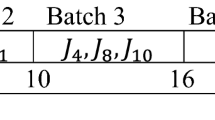Abstract
Due to the prevalence of e-learning and information technology, a wide choice of various learning styles is offered. So we might have multiple learning paths for a teaching material. However, learners differ from one another in their information literacy and cognitive load. These will influence the learning achievements greatly. Learners lacking information literacy are probably not able to determine their leaning paths easily. For example, obligatory courses, precedence relationship, time limit, and leaning effect should be taken into account. In light of these observations, we propose a genetic algorithm for determining leaning paths with many topics and a branch-and-bound algorithm for providing optimal learning paths of few learning topics.
Access this chapter
Tax calculation will be finalised at checkout
Purchases are for personal use only
Similar content being viewed by others
References
Chen CM (2008) Intelligent web-based learning system with personalized learning path guidance. Comput Educ 51:787–814
Chen CM, Liu CY, Chang MH (2006) Personalized curriculum sequencing utilizing modified item response theory for web-based instruction. Expert Syst Appl 30:378–396
Probert E (2009) Information literacy skills: teacher understandings and practice. Comput Educ 53:24–33
Natalle EJ, Crowe KM (2013) Information literacy and communication research: a case study on interdisciplinary assessment. Commun Educ 62:97–104
Timmersa C, Veldkamp B (2011) Attention paid to feedback provided by a computer-based assessment for learning on information literacy. Comput Educ 56:923–930
Badiru AB (1992) Computational survey of univariate and multivariate learning curve models. IEEE Trans Eng Manage 39:176–188
Wang JY, Chang TP, Chen JS (2009) An enhanced genetic algorithm for bi-objective pump scheduling in water supply. Expert Syst Appl 36:3772–3790
Lopez EG, O’Neill M (2009) On the effects of locality in a permutation problem: the Sudoku puzzle. In: Proceedings of the IEEE symposium on computational intelligence and games, Milano, Italy, pp 80–87
Acknowledgments
The authors would like to thank the National Science Council (NSC) of Taiwan for partially supporting this research under Contract NSC-101-2511-S-241-004.
Author information
Authors and Affiliations
Corresponding author
Editor information
Editors and Affiliations
Rights and permissions
Copyright information
© 2013 Springer Science+Business Media Dordrecht
About this paper
Cite this paper
Wang, JY., Shih, YH., Chen, JS. (2013). Algorithms for Batch Scheduling to Maximize the Learning Profit with Learning Effect and Two Competing Agents. In: Park, J.J., Barolli, L., Xhafa, F., Jeong, H.Y. (eds) Information Technology Convergence. Lecture Notes in Electrical Engineering, vol 253. Springer, Dordrecht. https://doi.org/10.1007/978-94-007-6996-0_46
Download citation
DOI: https://doi.org/10.1007/978-94-007-6996-0_46
Publisher Name: Springer, Dordrecht
Print ISBN: 978-94-007-6995-3
Online ISBN: 978-94-007-6996-0
eBook Packages: EngineeringEngineering (R0)




